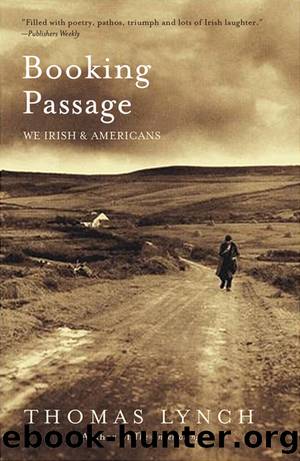Booking Passage by Thomas Lynch

Author:Thomas Lynch
Language: eng
Format: epub
Publisher: W. W. Norton & Company
Published: 2012-02-12T16:00:00+00:00
Bits & Pieces
Messages
Nora rode a Raleigh bike. It was black and basic—three gears, hand brakes, a pump for the inevitable punctures. A gray leatherette bag hung from the handlebars. Every day or every other she’d ride into town for “messages.”
She would return with some muttonchops and rashers, the day’s provisions, staples and necessities, ten Woodbines for Tommy, Maguire & Patterson matches, and a newspaper. The spuds and onions and cabbage all came from the haggard out the back door beyond the whitethorn trees. The eggs came fresh from her own hens. Bread she made—plump loaves of soda bread, crossed like a good Catholic, baked in her covered cast-iron pot with turf coals on bottom and on top. Milk was their business. Now and then she’d kill a goose.
But it was that trope, “going for messages”—not marketing, not shopping—that best described the difference between the “custom” in West Clare and “consumers” in Michigan.
“Pa Hawk’s” was her first stop—Pat Haugh’s Central Stores. Neighbor ladies from town and country would be there, Mrs. Haugh, and her daughters. She’d buy Lyons Green Label tea, some biscuits and a pound cake for the inevitable guests, a tin of peas and corn, Chimo for the soot—bits and pieces. There’d be talk of the weather—“We’re perished with it”—and news of the world, “Godhelpus.” Were there visitors in town, someone gone off, anything happening to anybody? “Now Missus,” she’d say, holding forth the payment. “Now Nora,” with the change. “And many thanks.”
To the Irish House then for an Independent or Ireland’s Own or the Champion, maybe a Confirmation or First Communion card, some sweets—Scots Clan—and talk. Someone in hospital? Someone to Dublin? Someone home?
“The weather’s very broken.”
“By cripes, ’tis true for you.”
Then up O’Curry Street to Peggy Starrs Off License for a half bottle of Paddy to keep in the house and word of anyone that Peggy knew that Nora knew. Across to the Bank of Ireland to leave the pension in and chat with the others waiting in line. Who was pregnant? “Is she?” Who was courting? “Go ’way out of that.” Who was getting married soon? “Musha lovely Nora!” Who died? “Did you hear what I’m after hearing below?”
To Maloney’s the Draper for a look at the latest, a new tablecloth, stockings, or shirt. “Any word from the crowd in America?” Then to Nolan’s Victuallers for the meat—some banter and barter—“Fresh eggs, Mr. Nolan, for a bit of beef. What say ye?”
Nora’s was an information economy—her news in trade for the other’s news—the pleasure of each other’s words, the pleasure of their own.
By then in America we went to “super” markets for the stuff and filled the back of cars with a month’s provisions and spent the time at the checkout watching the charges as the clerk rang them up, or rummaging for the coupons, or sighing in commiseration with our fellow shoppers and sellers for whom the transactions had become just work, just getting it—the money and the stuff. In trade for “messages” we got
Download
This site does not store any files on its server. We only index and link to content provided by other sites. Please contact the content providers to delete copyright contents if any and email us, we'll remove relevant links or contents immediately.
Harry Potter and the Goblet Of Fire by J.K. Rowling(3024)
Unfinished: A Memoir by Priyanka Chopra Jonas(2911)
Never by Ken Follett(2872)
The Man Who Died Twice by Richard Osman(2289)
Machine Learning at Scale with H2O by Gregory Keys | David Whiting(2264)
Fairy Tale by Stephen King(2058)
Will by Will Smith(2032)
Rationality by Steven Pinker(1760)
The Storyteller by Dave Grohl(1656)
The Dawn of Everything: A New History of Humanity by David Graeber & David Wengrow(1564)
The Dark Hours by Michael Connelly(1562)
The Stranger in the Lifeboat by Mitch Albom(1529)
Cloud Cuckoo Land by Anthony Doerr(1428)
The Becoming by Nora Roberts(1323)
Friends, Lovers, and the Big Terrible Thing by Matthew Perry(1321)
Crying in H Mart by Michelle Zauner(1312)
Einstein: His Life and Universe by Walter Isaacson(1311)
New Morning Mercies: A Daily Gospel Devotional by Paul David Tripp(1301)
A Short History of War by Jeremy Black(1295)
